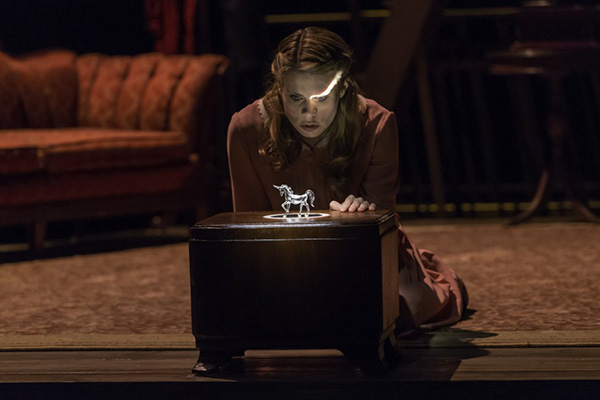
Running through February, the Broadway revival of Tennessee Williams’ theatrical masterpiece “The Glass Menagerie,” playing at the Booth Theater, has been receiving a lot of hype since its opening at the end of September — and every bit of it is to be believed. Although the performances certainly are incredible, it is the combination of everyone’s efforts that lets the revival leap with the vigor of Williams’ resonating Americana voice and arrest the minds of the audience.
“The Glass Menagerie,” for anyone unfamiliar with the story, is about the lives of the members of the Wingfield family — particularly through the eyes of Tom (Zachary Quinto), a writer who yearns for adventure and excitement in his humdrum life as his mother Amanda (Cherry Jones), a Southern belle who relishes in nostalgia, encourages her crippled and shy daughter Laura (Celia Keenan-Bolger) to find a gentleman caller. The story is seen through the lens of Tom’s memory as he recounts the events of his life.
But because the play centers on the idea of nostalgia and unfulfilled desires, there is an element of fabrication to it — an idyllic tragedy, almost — where reality does not set in until the arrival of Jim, a clerk from the factory Tom works at, who causes a major shift in the family’s relationship.
The set is made up of two separate spaces placed atop a pool of black liquid, meant to represent a dreamlike state. The music running throughout the play is both mesmerizing and intoxicating — a single piano score, composed of haunting scales.
Quinto, as Tom, speaks and punctuates the whole stage with the rich molasses quality of his voice. He sets the tone of the story, weaving through the poetry of Williams’ work with a calm strength. This play’s strongest factor is that it is made up of the dialogue and narrative of Tennessee Williams — the closest we have to an American Bard. There is something quotable in every moment.
Even with all these strengths, there still needs to be an emotive propellant to focus the power of the play, and the cast undoubtedly delivers. From the dark humor of a subdued melancholy to the violent tempers that break out when the illusion of the Wingfield family is broken every beat and heartbeat of the performance plays to the note that it is supposed to hit. ]
The only possible complaint that could be made is the one or two instances of body-verbal language confusions where the dialogue doesn’t match the physical reaction. Still, though, this is minor nitpicking, as “The Glass Menagerie” completely strikes its comedic and its tragic marks.
Nikolas Reda-Castelao is a contributing writer. Email him at [email protected].





















































































































































